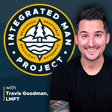
From Hypervigilance to Mindfulness: A Navy SEAL's Path to Inner Peace (feat. Jon Macaskill)
Welcome back to The Therapy4Dads Podcast! In today's episode, we have a very special guest joining us, Jon Macaskill (pronounced Muh-KAS-kill) is a retired Navy SEAL Commander turned mindfulness teacher and leadership coach. During his 24-year Navy career, he served in multiple highly dynamic leadership positions, from the battlefield to the operations center and the board room. Jon's unconventional yet highly effective style of teaching leadership is fueled by his passion for helping people and organizations become the best versions of themselves. He takes what helped him excel in his professional life and heal in his personal life and now shares this through mindfulness coaching, grit and resilience training, and keynote speaking, all in the pursuit of helping others achieve their full potential.
Here are 3 key takeaways from this eye-opening conversation:
1️⃣ Processing Trauma: Jon emphasizes the significance of addressing trauma early on, rather than bottling it up. Trauma is not a disorder; it's a natural human response. Seeking professional help and utilizing tools like mindfulness and meditation can play a vital role in processing trauma and promoting mental well-being.
2️⃣ Hypervigilance & Stress: Jon sheds light on the impacts of hypermasculinity, the fear of losing identity, and the constant need to maintain a tough exterior. Hypervigilance can keep us in a perpetual fight-or-flight state, leading to burnout and difficulty in connecting emotionally. Mindfulness practices can help break through these barriers and offer tools to better handle stress, anxiety, and sadness.
3️⃣ Mindfulness and Parenting: Jon shares his journey as a father, highlighting how mindfulness has transformed his parenting approach. By being fully present and mindful, he prioritizes family time, strengthens bonds, and cherishes the limited moments he has with his children. Mindfulness enables him to better navigate the challenges of hypervigilance and create a healthy balance between protection and giving his children the space to learn and grow.
Remember, taking care of our mental fitness is just as important as physical fitness. Let's break the stigma around vulnerability and build a stronger, more resilient community.
WATCH ON YOUTUBE:
SUPPORT THE SHOW:
CLICK HERE: BuyMeACoffee/Therapy4Dads
JOIN the MAILING LIST & GET INVOLVED!
Connect and Support Jon:
LinkedIn: Jon Macaskill
Web: https://frogmanmindfulness.com/
POD: https://mentalkingmindfulness.com/
Connect and Support Travis:
YouTube: Travis Goodman
Instagram: @Therapy4Dads
Check out the Website: Therapy4Dads.com





